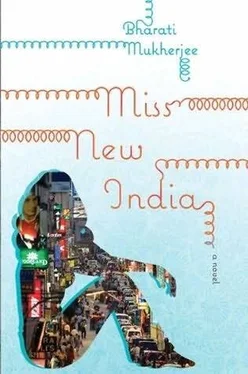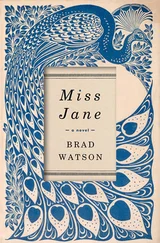At nineteen, Anjali Bose was a tall girl, one hundred and seventy-three centimeters-five foot eight-taller than most boys in her college. She was on the girls' field hockey team. She smiled readily and when she did, she could light up a room like a halogen lamp. The conventional form of Indian femininity projects itself through long-lashed, kohl-rimmed, startled black eyes. Modest women know to glance upward from a slightly bowed head. Anjali did not take in the world with saucer-eyed passivity. Her light, greenish eyes were set off by high cheekbones and prominent brows. Her face resolved itself along a long jaw and generous mouth, with full lips and prominent teeth. Her parents, looking to the day they would have to marry her off, worried openly about her overly assertive features. But the rare foreigners who passed through town, health workers or financial aid consultants for international agencies, found her looks striking and her boldness charming. Speaking to them, she sometimes claimed a touch of Burmese or Nepali ancestry. She told many stories, all of them plausible, some of them perhaps even true. She always made an outstanding first impression.
On any street at market hour in the provincial town of Gauripur, in the state of Bihar, there could be a dozen Anjalis-"offerings to god"-but no man not a relative would dare call them by name. Most of those other Anjalis would be married, hobbled by saris, carrying infants or clutching the hands of toddlers while their husbands haggled for fish and vegetables. To be hailed from the street by a man on a scooter would be scandalous. The call had to be for her, the strider in jeans and a T-shirt advertising the maiden tour (Hamburg, Stuttgart, Köln, Basel, Zürich, Wien, Bratislava-she loved the umlauts) of Panzer Delight, a German punk-rock band, some few years back-the young woman who could wait to be called by the name she preferred, Angela, or better yet, Angie. A rusty old Lambretta scooter, the kind that had been popular with Gauripur's office workers way back in the 1960s, braked to a wheezing stop; its driver waved and nudged it toward her through the blue diesel smoke from buses and trucks, the dense clutter of handcarts and bicycles: swollen, restless India on the move.
She was standing outside Gauripur Bazaar, known locally as Pinky Mahal, the town's three-story monument to urban progress. When Pinky Mahal was being built, bricks had been carried, one by one, by dozens of child laborers hired by the day. Rows of women workers had threaded their way along single planks, balancing bowls of cement on their heads and then dumping the contents into plastic buckets. During the construction a corporate billboard had stood on Lal Bahadur Shastri (LBS) Road, an epic portrait to feed a credulous public: a magnificent, five-story office tower behind a small landscaped forest of shade and flowering trees, lawns, fountains, and sundials. On the billboard turbaned doormen greeted the gleaming row of imported cars pulling up at the building's entrance. And above the turbaned heads floated two legends: YOUR NEW CORPORATE HDQS IN BEAUTFUL, EXCITING GAURIPUR! AND ACT NOW! COMMERCIAL SPACE GOING FAST!
Fanciful renderings of a future that would never come.
The office tower, with three stories instead of the advertised five, was completed in a year, but within six months of its ceremonial opening the pink outer plaster had begun to crumble, leaving long veins of exposed brick. The contractor claimed that the pink paint was sour and had reacted to the sweet plaster. Acid and alkaline, the developer explained to the press, then absconded to the Persian Gulf. And so Pinky Mahal, its two top floors unoccupied, its ground floor leased and subleased by owners of small shops who put up with fluctuating electrical service and no air conditioning because of the low rent, had become an eyesore rather than a proud monument in the center of town.
When Pinky Mahal failed, the spirit of Gauripur was crushed.
Then the call came again, slightly revised: "Angie!"
Mr. Champion pulled his scooter into the safety of the gutter, and Anjali towered above him, standing on the high edge of the cracked sidewalk. She hadn't seen much of her former teacher in the twelve months since she'd graduated from Vasco da Gama High School and enrolled in Vasco da Gama College's B. Comm. program. During that time he'd grown a reddish beard speckled with gray. A patched book bag was slung over his shoulder, and he still wore his trademark handloom cotton kurta over blue jeans. From her elevated vantage point, she saw that his hair was thinning. Mosquitoes buzzed over the bald spot. They landed, but he appeared not to notice.
He had to be over fifty, considering that he'd been in Bihar for nearly thirty years, but was still so slim and energetic that he seemed boyish. All American men-within the tiny compass of her experience-seemed boyish. Her father, a railway clerk, was younger than Mr. Champion but looked older. It was impossible to think of her stout father, with his peremptory voice and officious manners, in anything but the role of upholstered patriarch. He would never wear a wrinkled shirt in public or shirtsleeves to the office, and he had never owned blue jeans.
"I thought you were leaving," the American said. Then, with more emphasis, "In fact, I thought you told me you were leaving, and that was months ago."
When in doubt, smile. She smiled. "I like your beard, Mr. Champion."
"I'm not your teacher anymore, Anjali. You can call me Peter."
"Only if you call me Angie."
She'd had a secret crush on her teacher her last three years at Vasco da Gama High School, though, like all other da Gama students speaking to teachers, she'd addressed him as sir and Mr. Champion to his face, and as "the American" behind his back. He was the only layman under sixty and the only white man in the school run by Goan and South Indian priests.
"Angie, why are you still here?"
It was a question she often asked herself. She could more easily visualize herself in a fancy Mumbai café overlooking the Gateway of India, stirring a foamy pink falooda with a long spoon in a frosty glass, than nibbling spicy savories from a street vendor in Gauripur, something she had been about to do when Mr. Champion startled her.
"I might ask the same of you, sir-I mean, Peter," she retorted, grateful that her lips and chin weren't greasy from eating deep-fried pakoras.
"Same as you, Angie. Studying."
It was their special joke: although he earned his living as a teacher, one in fact openly admired for having introduced a popular course on U.S. business models and advertising strategies with supplementary units on American culture and idiom, he considered himself "a perennial student." But not like typical Indian students, those driven rote learners with one obsessive goal: admission to an Indian Institute of Technology. A lifetime of prosperity and professional success or poverty and shame depended on how relentlessly they crammed for national entrance examinations.
"I thought you said you had to get out if you wanted to stay sane."
"There were weddings." She lied. "My sister got married. I couldn't just pick up and leave." A spontaneous untruth; it just slipped out.
He frowned and she felt a liar's momentary panic. Maybe she'd already used the wedding excuse, and forgotten. Family weddings and funerals are the incontestable duties and rituals of Indian life. There's always a sister or cousin being married off, an ailing uncle being nursed, a great-uncle being mourned.
Truthfully, Angie had a sister. Her name was Sonali, and she had been married five years before to a bridegroom whose ad and picture in the matrimonial column of a Bangla-language local newspaper had met Sonali's, and their father's, approval. Now Sonali was a divorced single mother, living with her four-year-old daughter in a one-room flat in Patna, the nearest large city, and working as steno-typist-bookkeeper for the stingy owner of a truck-rental company. The bridegroom was discovered, too late, to be a heavy drinker and philanderer. But when Sonali had finally got up her nerve to institute divorce proceedings, their father had turned against her for wreaking on the Bose family the public shame of divorce.
Читать дальше












